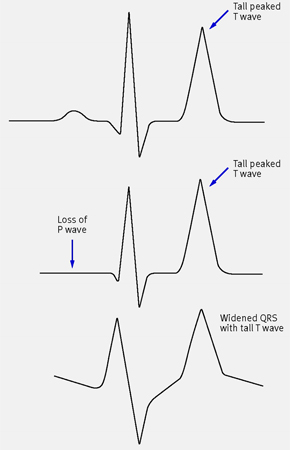Resumo
Definição
História e exame físico
Outros fatores diagnósticos
- muscle weakness
- generalized fatigue
- paresthesia
- muscle cramps
- flaccid muscle paralysis
- bradycardia
- nausea and vomiting
- diarrhea
- shortness of breath
- chest pain
- palpitations
- extrasystoles
- cardiac pauses
- tachypnea
- depressed or absent deep tendon reflexes
- hypoactive or absent bowel sounds
Fatores de risco
- kidney dysfunction
- heart failure
- use of renin-angiotensin-aldosterone system inhibitors (RAASi)
- use of aldosterone antagonists
- use of trimethoprim
- liver disease
- tissue breakdown
- distal renal tubule defects
- diabetes mellitus
- diabetic ketoacidosis
- use of other drugs that cause hyperkalemia
- increased intake of potassium
- metabolic acidosis
- digoxin (digitalis) toxicity
- primary adrenal insufficiency
- hyperkalemic periodic paralysis
Investigações diagnósticas
Primeiras investigações a serem solicitadas
- serum potassium
- 12-lead ECG
- blood gas
- CBC
- plasma glucose
- renal chemistry
- serum calcium
Investigações a serem consideradas
- uric acid and phosphorus
- creatine kinase
- serum digoxin level
- cortisol and aldosterone levels
- 24-hour urine potassium excretion
- plasma and urine potassium and osmolality
- urine pH
- plasma renin activity
Algoritmo de tratamento
acute hyperkalemia with potentially life-threatening features
acute hyperkalemia without potentially life-threatening features
chronic hyperkalemia
Colaboradores
Autores
Sri G. Yarlagadda, MD
Associate Professor
Kidney Institute
The University of Kansas Medical Center
Kansas City
KS
Declarações
SGY declares that she has no competing interests.
Revisores
Manish Suneja, MD
Professor
University of Iowa and Carver College of Medicine
University of Iowa Hospitals and Clinics
Iowa City
IA
Declarações
MD receives royalties from McGraw Hill as editor of DeGowin's Diagnostic Examination.
Annette Alfonzo, MbChB, MRCP, MD
Consultant Nephrologist
Victoria Hospital
Kirkcaldy
Fife
UK
გაფრთხილება:
AA declares that she has no competing interests.
რეცენზენტების განცხადებები
BMJ Best Practice-ის თემების განახლება სხვადასხვა პერიოდულობით ხდება მტკიცებულებებისა და რეკომენდაციების განვითარების შესაბამისად. ქვემოთ ჩამოთვლილმა რეცენზენტებმა თემის არსებობის მანძილზე კონტენტს ერთხელ მაინც გადახედეს.
გაფრთხილება
რეცენზენტების აფილიაციები და გაფრთხილებები მოცემულია გადახედვის მომენტისთვის.
წყაროები
ძირითადი სტატიები
Alfonzo A, Harrison A, Baines R, et al; UK Kidney Association (formerly the Renal Association). Clinical practice guidelines: treatment of acute hyperkalaemia in adults. June 2020 [internet publication].სრული ტექსტი
Rafique Z, Peacock F, Armstead T, et al. Hyperkalemia management in the emergency department: an expert panel consensus. J Am Coll Emerg Physicians Open. 2021 Oct;2(5):e12572.სრული ტექსტი აბსტრაქტი
Lott C, Truhlář A, Alfonzo A, et al. European Resuscitation Council Guidelines 2021: cardiac arrest in special circumstances. Resuscitation. 2021 Apr;161:152-219.სრული ტექსტი აბსტრაქტი
Clase CM, Carrero JJ, Ellison DH, et al. Potassium homeostasis and management of dyskalemia in kidney diseases: conclusions from a Kidney Disease: Improving Global Outcomes (KDIGO) controversies conference. Kidney Int. 2020 Jan;97(1):42-61.სრული ტექსტი აბსტრაქტი
Rossignol P, Legrand M, Kosiborod M, et al. Emergency management of severe hyperkalemia: guideline for best practice and opportunities for the future. Pharmacol Res. 2016 Nov;113(pt a):585-91.სრული ტექსტი აბსტრაქტი
გამოყენებული სტატიები
ამ თემაში მოხსენიებული წყაროების სრული სია ხელმისაწვდომია მომხმარებლებისთვის, რომლებსაც აქვთ წვდომა BMJ Best Practice-ის ყველა ნაწილზე.

დიფერენციული დიაგნოზები
- Pseudohyperkalemia
მეტი დიფერენციული დიაგნოზებიგაიდლაინები
- Hyperkalemia management in the emergency department: an expert panel consensus
- Potassium homeostasis and management of dyskalemia in kidney diseases: conclusions from a Kidney Disease: Improving Global Outcomes (KDIGO) controversies conference
მეტი გაიდლაინებიშედით სისტემაში ან გამოიწერეთ BMJ Best Practice
ამ მასალის გამოყენება ექვემდებარება ჩვენს განცხადებას